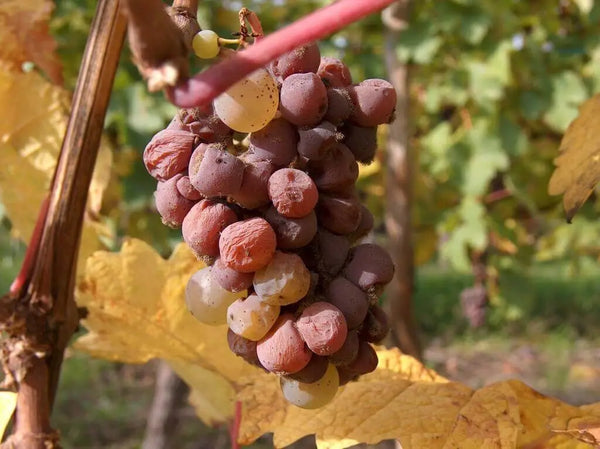If you appreciate exuberant wines with exotic flavors, Gewurztraminer is very likely made for you! A key grape variety of the Alsace vineyard, it is all too often limited to the sole image of sweet wine. Yet, this variety has much more to offer us...
Where does Gewurztraminer originate from ? What types of wine can it produce ? What should you expect during tasting ? Which dishes should it be paired with?
These are just some of the questions you will find answers to in this article!
Summary
Origins and cultivation of Gewurztraminer
Gewurztraminer is none other than the pink and aromatic variety of Savagnin blanc, a grape variety now very present in the Jura and notably used to produce the famous Vin Jaune.This is also the direct descendant of an ancient grape variety from the Middle Ages: the Traminer rose (or Savagnin rose). The two varieties were long confused, as their characteristics are quite similar, except for a more aromatic character in Gewurztraminer.
Etymologically, the word "Gewurztraminer" is split into two parts: Gewürz meaning "spice" and Traminer, referring to the town of Tramin located in South Tyrol (or Alto Adige), in the northeast of Italy. Because yes, despite its Germanic-sounding name, it is indeed from this Italian province (where German is spoken) that the grape variety is believed to have originated !
The cold climate of this region is quite similar to that of Germany and Alsace, so Gewurztraminer later spread to these areas with great results. Moreover, it was only during the 19th century that the people of Alsace gave it its current name.
Thus, while Gewurzt' already had a significant presence in Alsace at the beginning of the 16th century, it was only from 1870 onwards that it began to develop there in a significant way. Today, it represents 2,500 hectares, or 16% of the vineyard, and is the second most widespread variety in the region after Riesling.
Outside Alsace, Gewurztraminer is very scarcely present in the rest of the French vineyards. There are only about a hundred hectares in the Languedoc as well as a handful in the Loire.
Finally, on a global scale, it represents 14,000 hectares and is notably present in Germany (about 800 hectares), Italy, Austria, Switzerland, as well as New Zealand and California.
Types of Gewurztraminer wine
Because of its great aromatic richness, Gewurzt' is often identified as a sweet wine. Nevertheless, let it be said, the majority of wines from this grape variety are dry white wines, that is to say, containing a maximum of 4g/L of residual sugars (which is only 3g in a bottle).
However, this grape variety is extraordinary in that it also allows the production of off-dry wines (4 to 12g/L of residual sugars), sweet wines (between 12 and 45g/L) as well as liqueur-like wines (+45g/L).
In Alsace, the terms Late Harvest (VT) and Selection of Noble Berries (SGN) both refer to sweet and liqueur-like wines :
- For Late Harvest, the grapes are harvested overripe so that they are full of sugars (at least 257g/L at the time of harvest... and therefore before fermentation, of course).
- For the Selection of Noble Berries, this is also the case but the berries must here be botrytized (noble rot) and have an even higher sugar concentration (at least 306g/L at the time of harvest!). As a reminder, botrytis is a microscopic fungus that cracks the skin of the grapes, leading to evaporation of water and a concentration of sugars and acids in the berries.
You will have understood, therefore, that Gewurzt' is capable of offering very different white wines in terms of sweetness, and consequently in terms of aroma.

The aromas of Gewurztraminer
Regardless of the level of sweetness, wines made from Gewurztraminer have in common that they are characterized by great expressiveness and a beautiful aromatic exuberance. More than 500 aromatic molecules have in fact been detected in the grape variety !
Thus, the common markers of this variety are notes of exotic fruits (lychee, mango, pineapple), stone fruit aromas (peach, apricot) but also a floral touch (rose, geranium). Finally, Gewurzt' regularly features spicy flavors (cinnamon, gingerbread, clove, etc.).
For a sweet or luscious Gewurztraminer, other fragrances may appear such as honey, candied fruits, mirabelle plum, or even date. In the case of a Selection of Noble Berries, aromas of mushroom (botrytis) and undergrowth may even be detected!
Finally, unlike Riesling, the acidity of Gewurztraminer is much more limited. As a result, its texture on the palate is often voluptuous and full-bodied, which is also due to the high alcohol potential of the grape variety.
Which dishes to pair with Gewurztraminer ?
The great richness of Gewurztraminer allows it to adapt to a myriad of dishes and cuisines.
Thus, a dry Gewurztraminer can be perfectly enjoyed on its own as an aperitif but also with seafood, fish, and shellfish. Asian cuisines (Chinese,Thai, Japanese, etc.) also pair very well with this grape variety. For example, one might think of pairings with salmon sushi, Thai-style fish in banana leaf, or delicious spring rolls.
Spicy and exotic dishes pair wonderfully well with sweet Gewurztraminers ! So don't hesitate to open a bottle of Gewurzt' with a shrimp curry in coconut milk, cod fritters, or a sea bream ceviche with mango... a real treat ! The foie gras is also a superb possible pairing, just like certain cheeses such as Roquefort, Munster or Maroilles.
Finally, opt for sweet Gewurztraminers with desserts. Fruit tarts, mango charlotte, or chocolate cake will be perfect partners here.
Regarding the serving temperature, a dry, semi-sweet, or sweet Gewurztraminer is ideally enjoyed between 8-10°C. If served too cold, the great expressiveness of the grape variety would be diminished. If drunk at too high a temperature, an unpleasant heaviness may emerge from the whole, particularly in the case of sweet and mellow wines.
The best Gewurztraminer wines
Although it is difficult to provide an exhaustive list of the best Gewurztraminers, La Cave Éclairée offers you here a fine selection of this grape variety exclusively from Alsace. From pleasurable Gewurztraminer to great wines for aging, there is something for every taste and budget! From small family estates like Mittnacht Frères or Barmès-Buecher to the excellent value for money of Domaines Schlumberger.
- Domaine Mittnacht Frères - Sweet Gewurztraminer Les Terres Blanches
From a family estate committed to biodynamics, this sweet Gewurztraminer delights with its balance between indulgentsmoothness and freshness. The nose reveals notes of lychee, rose, and exotic fruits, while the palate offers a controlled sweetness, never heavy.A pleasurable, accessible wine, perfect as an aperitif or with lightly spiced cuisine.
- Domaines Schlumberger - Gewurztraminer Les Princes Abbés
An iconic cuvée from the Schlumberger estate, this Gewurztraminer embodies the classic and precise style of Alsace. Expressive and generous, it develops aromas of ripe fruit, sweet spices, and flowers, supported by a beautiful structure. A harmonious, versatile wine, equally at ease with Asian dishes as with strong cheeses.
- Domaine Barmès-Buecher - Alsace Grand Cru Sweet Gewurztraminer Steingrubler
A great terroir wine, this Grand Cru Gewurztraminer comes from the prestigious Steingrubler, known for its ability to produce wines of great finesse. The palate is full, deep, with an elegant sweetness supported by remarkable tension. Complex aromas of candied fruit, spices, and floral notes : an age-worthy Gewurztraminer, crafted for gastronomy and special occasions.
You are now an expert in Gewurztraminer, all that's left is to enjoy its beautiful expressiveness ! Cheers !










